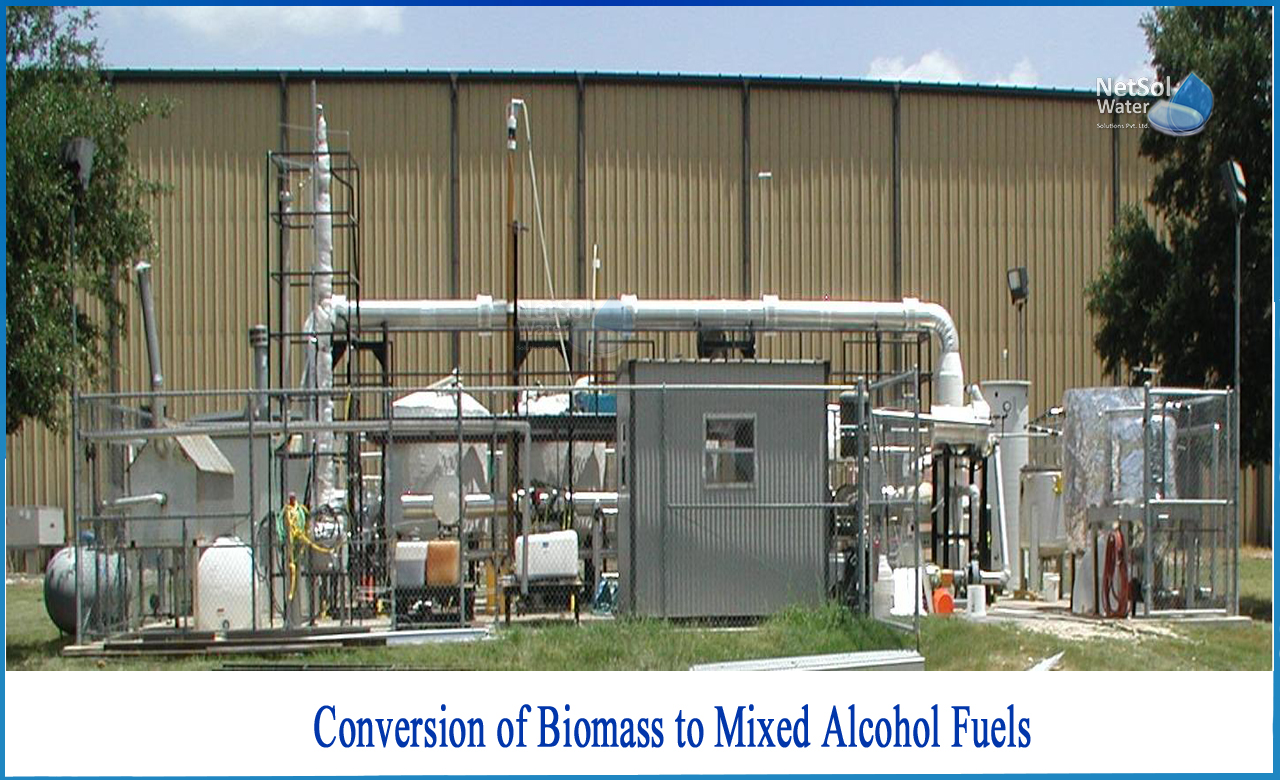What method converts biomass into alcohol fuels?
The Mixalco process can be used to convert biomass into mixed alcohol fuels. When biomass is converted to a mixed alcohol fuel via bioconversion, more energy from the biomass is converted to liquid fuels.
What is the working principle?
The method involves converting any biodegradable material (e.g., urban wastes such as municipal solid waste, biodegradable waste, and sewage sludge, agricultural residues such as corn Stover, sugarcane bagasse, cotton gin trash, manure) into useful chemicals such as carboxylic acids (e.g., acetic, propionic, butyric acid), ketones (e.g., acetone, methyl ethyl ket). This technique is a real bio refinery since it can produce a wide range of products at a low cost.
The process anaerobically digests biomass into a mixture of carboxylic acids produced during the acidogenic and acetogenic stages of anaerobic digestion, with the methanogenic final stage inhibited, using a mixed culture of naturally occurring microorganisms found in natural habitats such as cattle rumens, termite guts, and marine and terrestrial swamps.
The most common methods for producing ethanol and cellulosic ethanol require enzymes that must first be isolated before being introduced to the biomass to convert the starch or cellulose into simple sugars, which is then followed by yeast fermentation to produce ethanol. These microorganisms produce their own enzymes, thus no additional enzymes are required in this procedure.
Regulation of pH
The pH must be regulated since the bacteria anaerobically consumes the biomass and converts it to a variety of carboxylic acids. This is accomplished by adding a buffering agent (e.g., ammonium bicarbonate, calcium carbonate), resulting in a carboxylate salt combination. The presence of ammonium ions or the inclusion of an inhibitor, inhibits methanogenesis, which is the normal last stage of anaerobic digestion (e.g., iodoform). The generated carboxylate salts must be dewatered from the ensuing fermentation broth. Vapor-compression evaporation is a good way to do it. Depending on the desired final chemical or biofuel product, further chemical refinement of the dewatered fermentation broth may be necessary.
Is this method used to cleanse water?
The vapor-compression evaporation system's condensed distilled water is recycled back into the fermentation. If raw sewage or other high-BOD waste water that needs to be treated is used as the fermentation water, the condensed distilled water from the evaporation can be recycled back to the city or to the original source of the high-BOD waste water. As a result, this technique can be used to cleanse water while also producing valuable chemicals or biofuels.
Because the system uses a mixed culture of microbes, the fermentation does not require any enzymes and does not require sterility or aseptic conditions, making this first step in the process more cost-effective than other cellulosic ethanol production systems. These cost savings at the front end of the process, where quantities are huge, allow for more flexibility after dewatering, where volumes are tiny.
Brief info on Useful Chemicals
1: Carboxylic Acid: The method of "acid springing" can be used to renew carboxylic acids from carboxylate salts. A high-molecular-weight tertiary amine (e.g., trioctylamine) is used in this process, which is swapped with the cation (e.g., ammonium or calcium). The amine carboxylate that results can then be thermally degraded into the amine and the equivalent carboxylic acid, which can both be recycled. In this method, no chemicals are consumed or waste is generated during the process.
2: Ketones: Ketones can be produced in two ways. The first involves thermally converting calcium carboxylate salts to ketones. The other method for producing ketones entails converting vaporised carboxylic acids on a zirconium oxide catalytic bed.
3: Primary Alcohol: The fermentation residue that has not been digested can be used in gasification to produce hydrogen (H2). This H2 can then be utilised to hydrogenolyze the esters, which are made by esterifying ammonium carboxylate salts or carboxylic acids with a high-molecular-weight alcohol over a catalyst. The high-molecular-weight alcohol, which is recycled back into the esterification process, and the equivalent primary alcohols are the end products of hydrogenolysis.
4: Secondary Alcohol: The secondary alcohols are made by hydrogenating the appropriate ketones over a catalyst.
For sludge treatment, Netsol Water Solutions offer a complete spectrum of wastewater treatment products. Our engineers would gladly collaborate with your team to create the right design that meets your budget and objectives.
Netsol Water is Greater Noida-based leading water & wastewater treatment plant manufacturer. We are industry's most demanding company based on client review and work quality. We are known as best commercial RO plant manufacturers, industrial RO plant manufacturer, sewage treatment plant manufacturer, Water Softener Plant Manufacturers and effluent treatment plant manufacturers. Apart from this 24x7 customer support is our USP. Call on +91-9650608473, or write us at enquiry@netsolwater.com for any support, inquiry or product-purchase related query.



